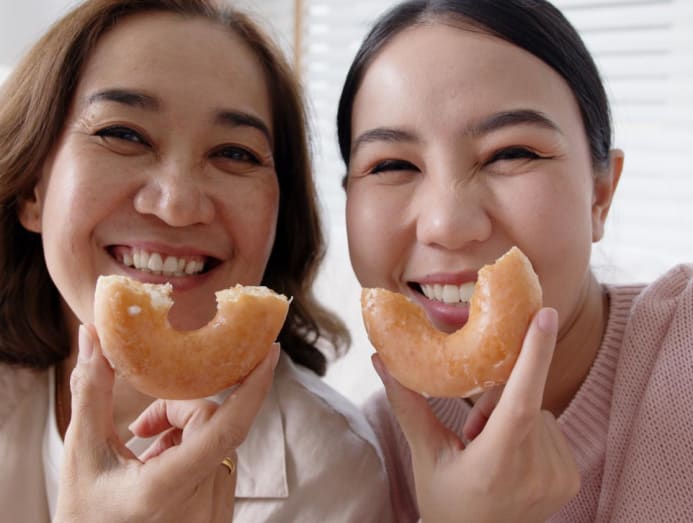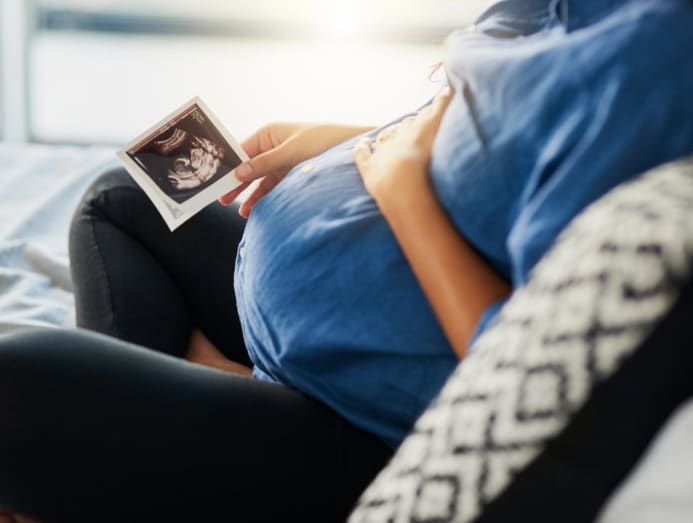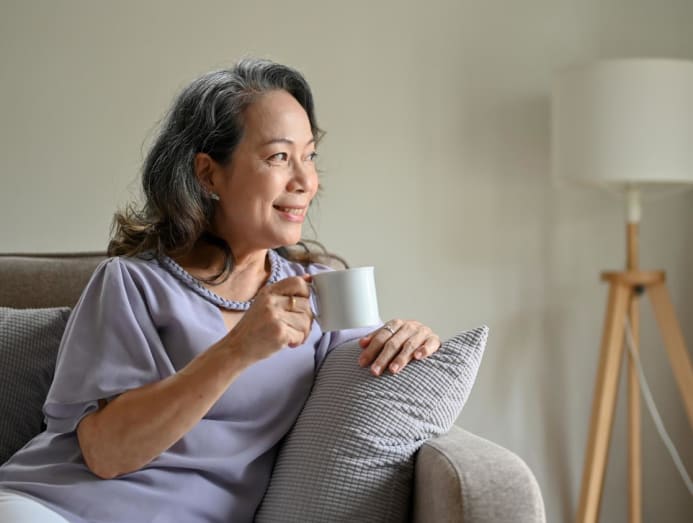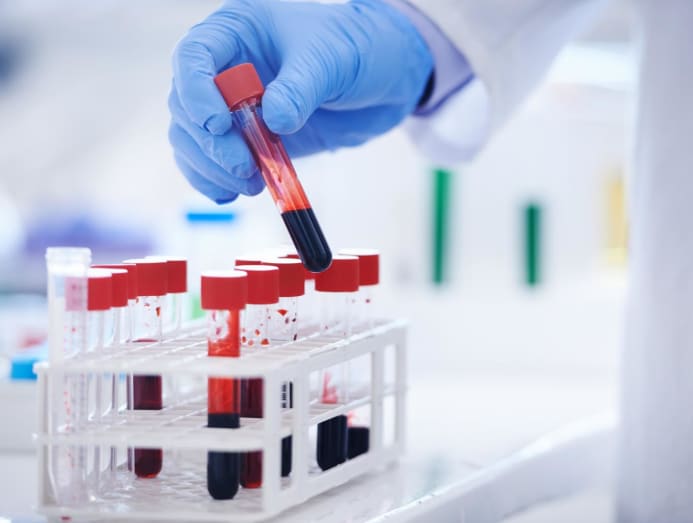From symptoms to age of onset, will you experience menopause the same way your mother did?
Some studies show that menopause is genetically linked, so asking your mum about her symptoms could prepare you for your own menopause in the future. Even so, how a woman goes through menopause is not so easy to predict, as CNA Women found out in this new series on menopause.

In about 50 per cent of women, genetic factors play a role in determining when menopause happens – if your mother menopaused at an early age, you may too. (Photo: iStock/vichie81)
If you remember your mother becoming extremely easily irritable or feeling somewhat depressed at one point in your life as you were growing up, this change in her demeanour might have been her going through menopause.
Studies have shown that menopause is somewhat genetically linked. The age your mother reached menopause and even her symptoms have been said to be a precursor of your own menopause.
Knowing this made me curious if I too, would be predisposed to the same unpredictable mood swings my mother went through.
Interestingly, while mothers are open about speaking to their teenage daughters about bodily changes during puberty, few seem as open about sharing their menopause experience.
Leanne Ho, a beauty content creator who turned 50 last year, told CNA Women that her mother had never spoken about her menopause. “The most vivid memory was of her coming out of her room and asking all of us in an exasperated voice if we were feeling as hot as she was.
“Looking back, I realised that she was probably going through menopause. Yet, she never mentioned it,” she recalled.
In fact, it was Ho who broached the topic with her mother not too long ago, having realised she herself was starting to see symptoms such as night sweats and unexplained weight gain.

One woman’s mum, however, did speak about it to her. Yvonne Koh, 46, said she was surprised that her mother spoke openly about her symptoms back then.
“She would actually tell me, ‘I think I’m being very emotional now because I’m going through my menopause’. So while it was not in an educational way, it was still good to hear her talk about what she was feeling at the time.”
Even so, Koh said nothing can prepare you for menopause. The founder of a communications company had a taste of what is to come when she went through medically-induced menopause for six months in her mid-30s, as part of her treatment for endometriosis.
In this case, the menstrual cycle and activity of the ovaries are suppressed through medical treatments for a certain period of time. Unlike surgical menopause, which involves removing both ovaries and is permanent, medical menopause is temporary.
Said Koh: “It was my first time experiencing hot flushes, cold sweat, insomnia, emotional swings and all the typical symptoms that we’ve read about relating to menopause. And going through it first-hand, albeit for a short while, was quite shocking.”
WILL YOU GO THROUGH MENOPAUSE AT THE SAME AGE YOUR MUM DID?
“The word ‘menopause’ is derived from the Greek words ‘men’ (monthly cycle) and ‘pausis’ (to end, stop), meaning the cessation of a women’s monthly cycle,” said Dr Arthur Tseng, consultant obstetrician and gynaecologist, and urogynaecologist at Gleneagles Hospital.
He added that the World Health Organization (WHO) describes menopause as “the loss of ovarian function with a sharp decline in female hormone levels, leading to a permanent cessation of menstruation for a full 12 months or more”.
In about 50 per cent of women, genetic factors play a role in determining when menopause happens. “Women whose mothers entered menopause at an early age appear to be at higher risk of early-onset menopause, usually at an age close to when their mothers first started experiencing symptoms,” said Dr Tseng.

On average, women menopause around 50-52 years, said Dr Choo Wan Ling, consultant obstetrician and gynaecologist at Choo Wan Ling Clinic for Women.
However, the hormonal and biochemical changes in your body can begin as early as 45 or as late as 55, added Dr Tseng. This period is known as perimenopause and menopausal symptoms can occur during time, even if you’re still menstruating.
Certain factors can help predict whether a woman menopauses earlier or later in life.
1. Smoking
“Many studies have shown that women who smoke 14 or more cigarettes a day, for 10 or more years, menopause two to three years earlier than female non-smokers”, said Dr Tseng.
2. Alcohol consumption
Dr Tseng said that women who don’t drink alcohol have been found to “enter menopause at an earlier age than women who consume alcohol”.
3. Having kids
Women who have never had children tend to have early menopause compared to women who do. “Having given birth appears protective, allowing for later menopause, as is having a first pregnancy later in life,” he added.
4. Lifestyle and diet
Said Dr Tseng: “Women who consume large amounts of polyunsaturated fats have an earlier onset of menopause.”

Research also shows that women who suffer from hypertension or have low exposure to the sun throughout their life tend to enter menopause at earlier ages, he added.
Conversely, a diet high in total calories, fruits and protein delays the onset of menopause, said Dr Tseng.
5. Oral contraceptives
The prevention of ovulation delays menopause, said Dr Tseng, which is why using oral contraceptive pills has been associated with later menopause.
However, Dr Choo cautioned that “there is no magic pill that can delay menopause” and that it is “a common misconception to think that hormonal pills may delay the onset of menopause”.
6. Your menstrual cycle
Many women believe that the earlier you start menstruating, the earlier you’ll reach menopause but that’s not the case.

“We are born with 400,000 primordial follicles. Given that we have about 40 reproductive years, it means that a lot of these follicles will never reach its full potential,” said Dr Choo. Primordial follicles are the potential eggs a woman might have in her lifetime, that may eventually develop into eggs.
“Hence, it doesn’t mean that starting menstruation at an early age will lead to earlier menopause. It is an internal mechanism that we have no control over that determines when our ovaries decide not to respond,” she added.
Ultimately, there is no foolproof method in determining when you reach menopause. “Even with blood tests, it is not possible to predict exactly when menopause may happen,” said Dr Choo.
Certain conditions too, such as ovarian cyst removal, autoimmune conditions and hysterectomy, might predispose women to earlier, as well as later, menopause.
Related:
TALK TO YOUR MUM AND OLDER FEMALE RELATIVES
Here’s food for thought: “The menopausal symptoms are no different today than it was 10 years ago,” said Dr Choo. But what has changed is how women are coping with the changes happening to them.
With easier access to information, higher education levels and being more aware of gynaecological and mental health issues, Dr Tseng believes women are seeking treatment for menopause earlier rather than later – and being more open rather than silent about it.
Ho, the content creator, agreed: “When I asked my mother how she coped when she went through menopause, she said that she didn’t know who to talk to and chose to bear it in silence.”

Both doctors agree that it’s helpful to speak with your mother, or female relatives like your aunts and older sisters, to help you cope with the changes ahead.
“It’s easy to get information about the physical symptoms that a woman goes through but not much about the mental or psychological impact to women and their families,” said Dr Choo. “These personal experiences would be interesting to find out as a daughter and might help you cope with the issues in the future.”
WHEN YOU’RE ON THE BRINK OF MENOPAUSE
First up, find out what the menopausal symptoms are. “It can make it easier for women to recognise it when it happens,” said Dr Choo.
Ho added that women today are more fortunate than their mothers. “Ageing is a natural thing. It isn’t a hurdle or stumbling block that we should run away from.
“There is so much information available on the internet now. Don’t tell yourself it’s too late. Speak to a doctor, read up on the information and do what feels comfortable for you.”
“Adapt, don’t fight,” is Ho’s motto. She has started incorporating long daily walks – 13km around MacRitchie Reservoir – and has also changed her mattress and bedding to ones that will keep her cool at night for more comfortable sleep.
And being the oldest of three girls in her family, Ho is being open with her younger sisters about this next phase in life. “My second sister, who is six years younger, was telling me about the unexpected mood swings she has been dealing with recently.
“I told her that it was natural and it was the hormones, and to not be too hard on herself. But more importantly, she should recognise the symptoms and find ways to cope with what was happening, like walking away to gather thoughts if she feels herself getting too emotional in a situation rather than letting her emotions get the better of her.”

Koh, who previously had menopause medically-induced for half a year, admitted that she is grateful for that first experience of what menopause would be like. “I’ve come to learn that it can be physically tiring – to be not sleeping well, to experience hot flushes and needing to adjust.”
Like Ho, Koh goes for regular walks too. “I do so to ensure I am in tune with my body, so when I have to adjust to this new phase, my emotions can also be better managed.”
Said Dr Tseng: “In the end, being able to cope with the changes and symptoms occurring will dictate the degree of happiness and sense of satisfaction women experience during this transitional period”.
And as Dr Choo said: “Information and knowledge is important as it helps prepare us for what to expect, and how we can better manage the condition. Menopause is not a disease, but a different stage of a woman’s life.”
CNA Women is a section on CNA Lifestyle that seeks to inform, empower and inspire the modern woman. If you have women-related news, issues and ideas to share with us, email CNAWomen [at] mediacorp.com.sg.







